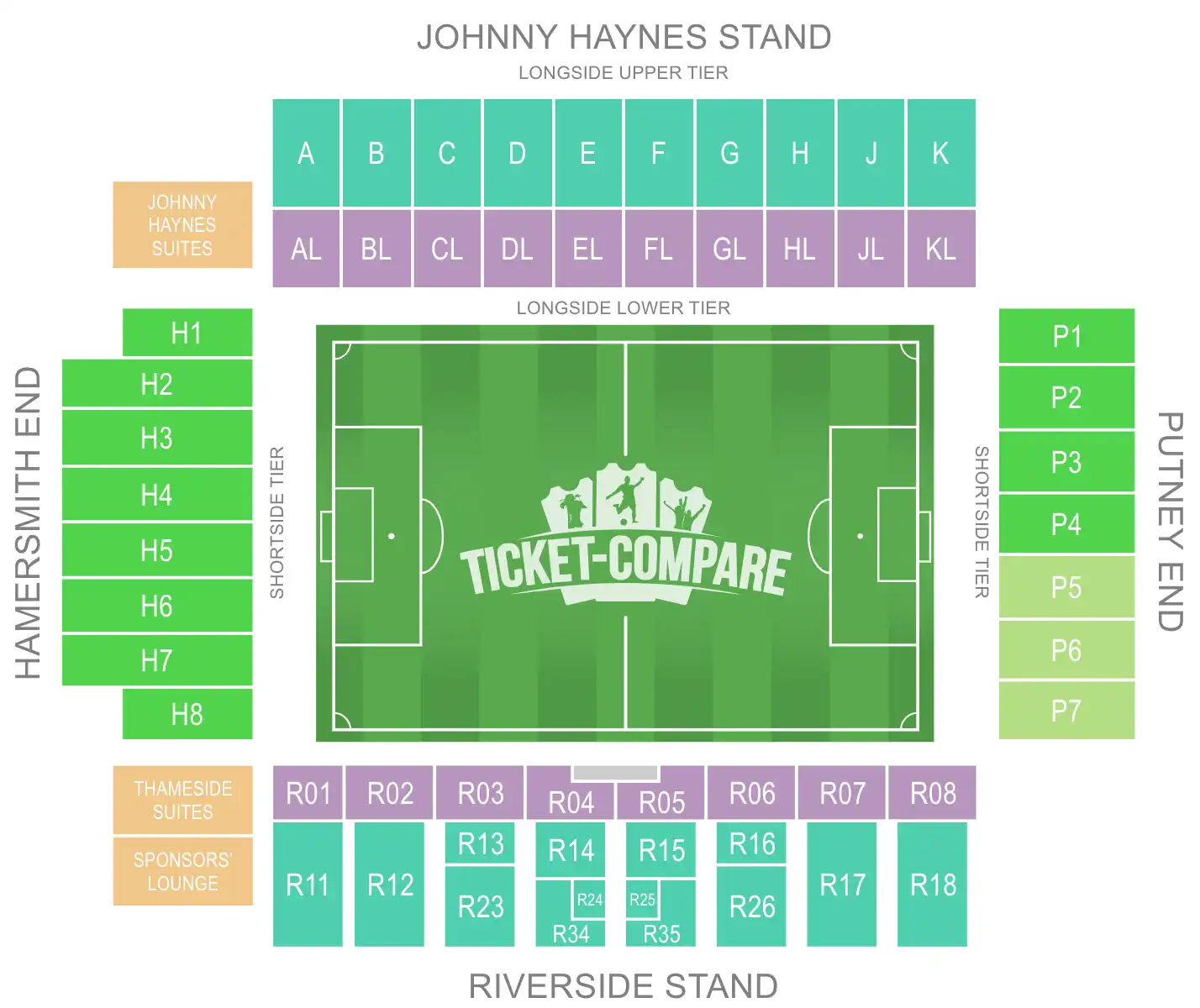Upcoming Matches
Fulham vs Nottingham Forest
Premier League・Craven CottageLondon, United Kingdomfrom £75948 available ticketsFulham vs Liverpool
Premier League・Craven CottageLondon, United Kingdomfrom £1243,770 available ticketsFulham vs Chelsea
Premier League・Craven CottageLondon, United Kingdomfrom £955,181 available ticketsFulham vs Middlesbrough
FA Cup・Craven CottageLondon, United Kingdomfrom £57304 available tickets
Craven Cottage Seating Plan at a Glance
- Craven Cottage Capacity: 24,500
- Opened: 1896 (Last major redevelopment: 2023)
- Safe Standing Spaces: N/A
- Location: London (Fulham)
- UEFA Stadium Rating: Category 4
| Stand | Approx Capacity | Blocks | Approx Rows | Stand Details |
|---|---|---|---|---|
| Hammersmith End | 7,300 | H1-H8 | 55 | Passionate home fans behind the goal |
| Johnny Haynes Stand | 5,832 | AL-KL, A-K | 31 | Historic longside stand with wooden seats |
| Putney End | 5,926 | P1-P7 | 52 | Includes away section on the southern shortside |
| Riverside Stand | 8,650 | R01-R35 | 54 | Modern stand by the Thames with luxury amenities |
Welcoming fans since 1896, Craven Cottage is considered by many to be the most beautiful stadium in the Premier League. This comes from its picturesque location by the Thames River, as well as historic features like the elegant Johnny Haynes Stand, and the mansion-like Cottage Pavilion. To help find the ideal place to watch the Cottagers, check out our seating guide for Craven Cottage.
Stands
Craven Cottage has four distinct stands, with a wide range of matchday experiences, from traditional to state-of-the-art. The seating rows at Craven Cottage are usually labelled with numbers for seats closest to the pitch, then single letters (A) and then double letters (AA) as you make your way up the stand.
Hammersmith End - 55 Rows - 7,300 Seats
The classic home end at Craven Cottage points northwest, upriver towards Hammersmith. This shortside stand is made up of a single tier, with seating spread across eight vertically arranged sections, H1 to H8, all served by turnstiles 44-48
The Hammersmith End is associated with Fulham’s most loyal and noisiest fans, who are known to spend the whole game standing up, especially in the seats at the back of the stand. The hardcore support is concentrated in sections H4, H5 and H6, immediately behind the goal.
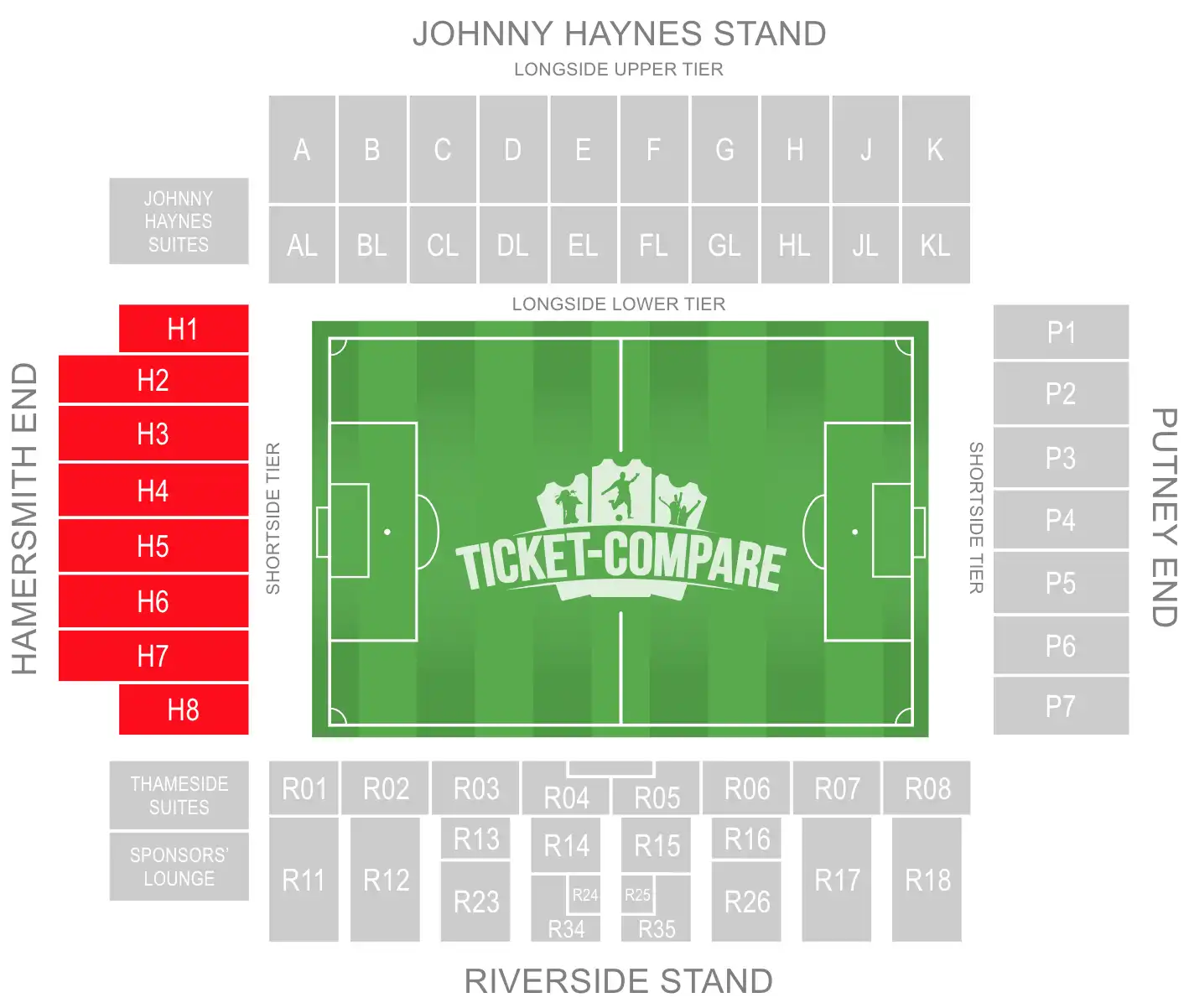
Going up the stand, the rows ascend from 2 to 6, then B to Z and then from AA to XX. Spectators enter the seating area through the stairwell high in the stand at row HH. Something to keep in mind is that the roof, which was constructed in the 1960s, does not cover the lowest five rows. It’s also worth remembering that there are two large columns between H4 and H5, which can obstruct views immediately above rows K and II (ii).
Johnny Haynes Stand - 31 Rows - 5,832 Seats
Dating back to 1905 and topped with the Fulham Football Club sign, the Johnny Haynes Stand is the oldest surviving stand at any stadium in the entire English Football League system.
This longside stand faces Stevenage Road on the east side of the stadium, with entrances from turnstile 18 to 43. The building is loved for its fine brick facade, and is named for Fulham’s greatest player, a creative midfielder who starred for the club from 1952 to 1970.
Over two tiers, the stand was designed by the famous stadium architect Archibald Leitch and is Grade II listed, retaining a lot of original features. Perhaps most unique are the original wooden ‘Bennet’ seats, which can be found throughout the stand’s Upper Tier.
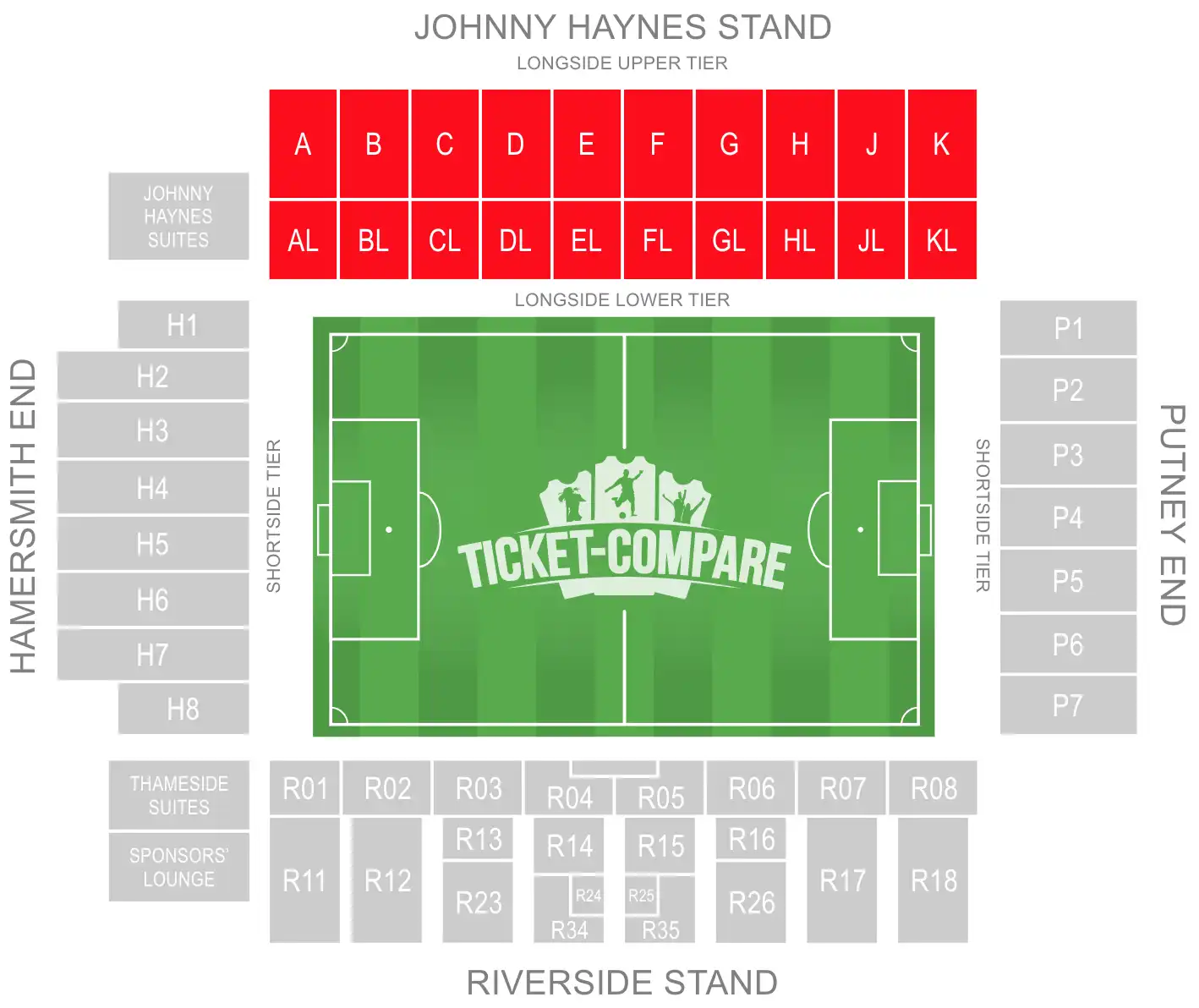
Something to keep in mind about a stand of this age is that there are obstructions, which may affect your viewing experience. In particular there are seven intrusive pillars supporting the roof in the pitchside rows of the stand’s Lower Tier.
As it is the only stand to face a road, the Johnny Haynes Stand houses facilities including the ticket office, reception, stadium store, and the press box.
The stairwell brings you out into the stand at Row I (i), which is approximately halfway up the Upper Tier. In the Lower Tier the rows rise from 1 to JJ, while in the Upper Tier they climb from from A to R.
Putney End - 52 Rows - 5,926 Seats
Pointing southeast and accessed by turnstiles 1-13, this shortside stand used to have a mixed reputation among Fulham fans. The reason is that there was a large neutral section here, with seats available to home and away fans, which is hard to imagine today. Now, the away seats are restricted to Blocks P5, P6 and P7 on the southern, riverside corner of the stand.
On the opposite side of the Putney End, closest to Stevenage Road is Cottage Corner. These seats are right beside the stadium’s iconic Cottage Pavilion, built in 1905. Sitting here, you have a perfect view of the players emerging from the tunnel before kick-off.
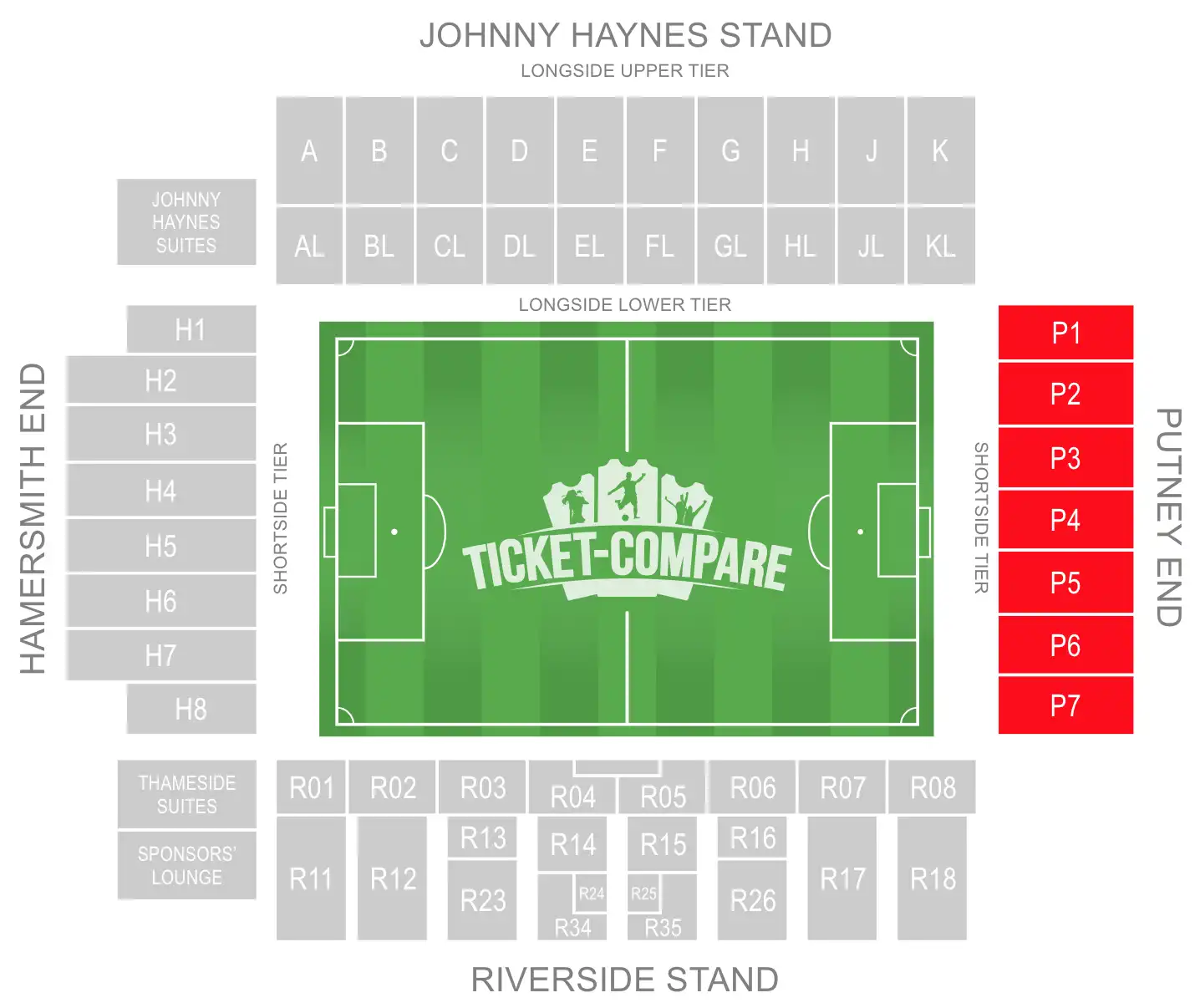
A large banner is draped from the wall of this building, with the words Still Believe. This refers to a chant, “Stand up if you still believe”, that started during Fulham’s comeback win against Hamburg in the Europa League semi-final in 2010.
Rows ascend from A, beside the pitch, to ZZ at the back of the stand. The front five rows are not protected by the stand’s roof, while the stairwell for each section is high in the stand at row JJ.
Riverside Stand - 56 Rows - 8,650 seats
Backing onto the River Thames, this longside stand has been completely redeveloped in the last few years. The previous Riverside Stand was built in the early 1970s, and had a plain appearance that clashed with the elegant Johnny Haynes Stand.
That old stand was pulled down in 2019 to make way for a glossy new development, due to be completed in 2025. The new Riverside Stand is designed to resemble a boat on the Thames, and the project will open this stretch of the river to the public via the Thames Path.
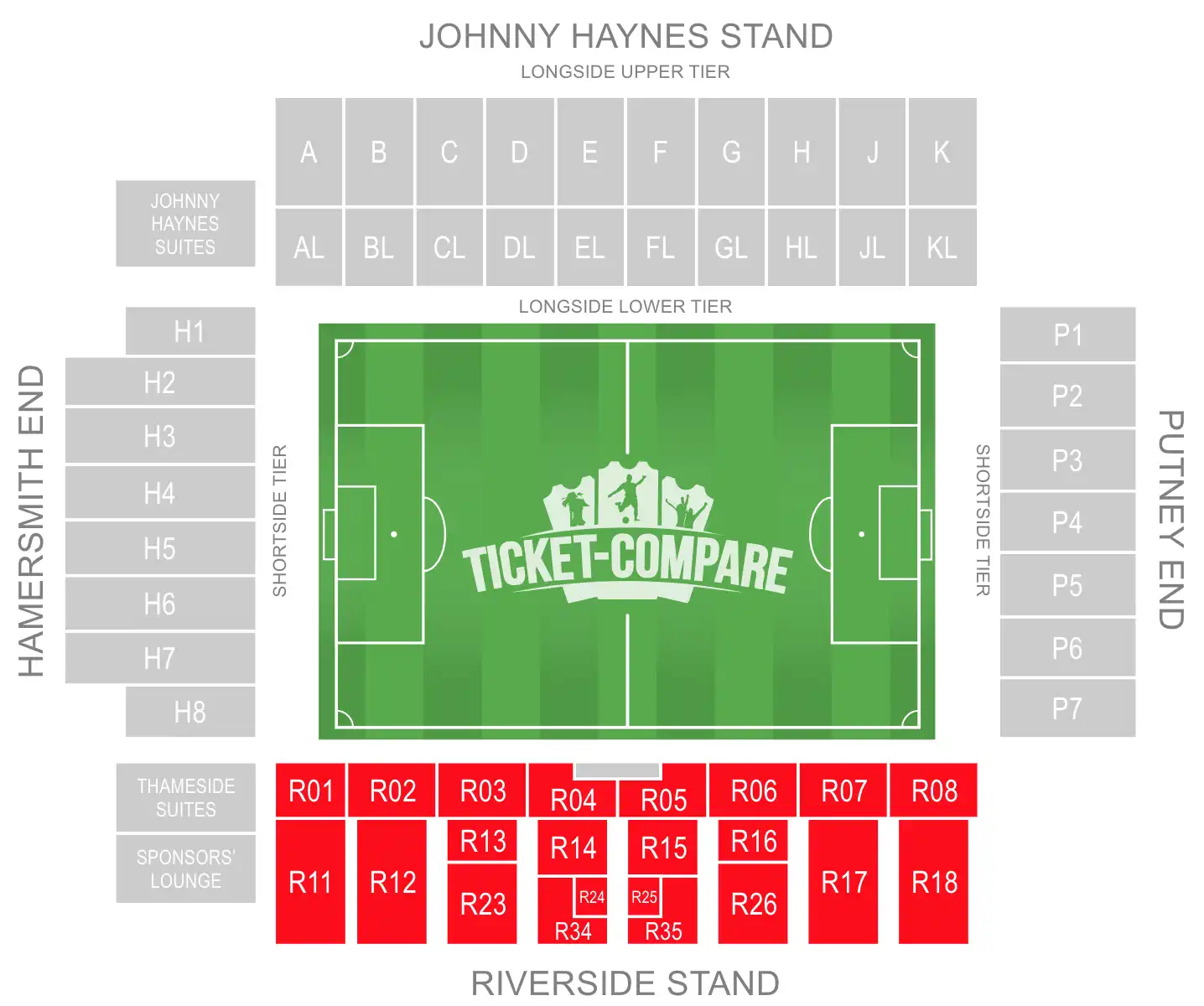
At the time of writing (March 2024), all of the blocks on the Lower Tier, R01 to R08, were open to the public. On the larger Upper Tier R11, R12, R17 and R18 were all open, with a big section in the centre of the Upper Tier still awaiting completion. These blocks are all entered through turnstiles 51-55, or the Hammersmith End turnstiles, 44-48.
The Riverside Stand also contains the TV camera position, as well as the dugouts on pitch level. When everything is up and running, this will be Craven Cottage’s stand for premium matchday seating, with eight restaurants and lounges, many taking advantage of the riverfront views. Most unique of all is the Sky Deck, a high-end rooftop terrace with a pool.
Where Should I Sit at Craven Cottage?
Different parts of this historic ground serve a different audience. Whether you’re coming to a game to experience the atmosphere, indulge in some fine dining, or enjoy a family day out, there’s an ideal spot for you.
For the Best Atmosphere
True to its reputation as a family stadium, Craven Cottage has enforced a strict no-standing policy for decades. This is in place across all of the stadium, with a small exception behind the goal in the Hammersmith End. This is the place to mingle with die-hard Fulham fans who spend the whole match standing and singing, especially at the back of the stand.
For the Best View
Without doubt, the new Riverside Stand offers the best views of the pitch. Being brand new, this stand is the only one at Craven Cottage with totally unobstructed views. The TV camera berths are located on the Riverside Stand, while the Lower Tier is behind the two dugouts, for an up-close view of the managers.
For the Premium Experience
The Riverside Stand, with its unbroken views, state-of-the-art facilities, and choice of eateries, is lined up as the venue for a high-end matchday experience. The stadium’s boxes meanwhile are attached to the sides of the Hammersmith End, where you’ll find the Johnny Haynes Superbox on the Stevenage Road side, and the Thameside Superbox by the river.
Finally, for something extra special, there’s the Cottage Pavilion. Here, it’s even possible to be a guest at the Chairman’s Private Dining Room where you might meet famous former pros. You also get to watch the game from the pavilion’s wrought-iron balcony, which has 32 exclusive seats on three rows.
For Families
Fulham FC has always been known for its welcoming atmosphere, but there are two areas specifically designated for families. These are in the Johnny Haynes Stand in the northernmost and southernmost blocks, A and AL, and K and KL. The club even provides special activities for kids on matchdays. These take place on the concourse below Block K an hour before kick-off, and include face-painting, video games, and the chance to meet the club mascot, Billy the Badger.
For the History
Dating back to 1905, the Johnny Haynes Stand is the ultimate place for football historians to watch a football match. There’s a lot to admire, from the gabled brick exterior to the narrow turnstiles and the steel roof structure. Most unique of all are the Upper Tier’s wooden seats that have been here since 1905, and have a narrow, curved back support. Some even still have armrests.
Accessibility
There are 86 wheelchair spaces at Craven Cottage, and these can be found in all four stands. They are found at a lower position in the Hammersmith End, Johnny Haynes Stand and Riverside Stand, and at a mid-level in the Putney End. All of these positions are served by ramps and are accompanied by a seat for a personal assistant. There are also 106 easy-access seats around the stadium for ambulant disabled fans.
| Section | Blocks | Block Count |
|---|---|---|
| Away | P5, P6, P7 P5, P6, P7 | 3 |
| Longside Lower Tier | AL, BL, CL, DL, EL, FL, GL, HL, JL, KL, R01, R02, R03, R04, R05, R06, R07, R08 AL, BL, CL | 18 |
| Longside Upper Tier | A, B, C, D, E, F, G, H, J, K, R11, R12, R13, R14, R15, R16, R17, R18, R23, R24, R25, R26, R34, R35 A, B, C | 24 |
| Shortside | H1, H2, H3, H4, H5, H6, H7, H8, P1, P2, P3, P4 H1, H2, H3 | 12 |
| VIP or Executive Box | JOHNNY HAYNES SUITES, SPONSORS LOUNGE, THAMESIDE SUITES JOHNNY HAYNES SUITES, SPONSORS LOUNGE, THAMESIDE SUITES | 3 |
